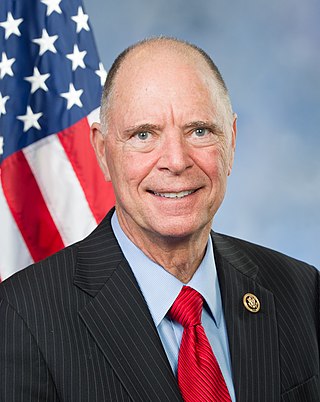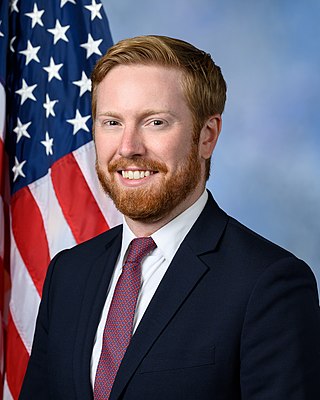
The Congressional Progressive Caucus (CPC) is a congressional caucus affiliated with the Democratic Party in the United States Congress. The CPC represents the furthest left-leaning faction of the Democratic Party. It was founded in 1991 and has grown since then, becoming the second-largest Democratic caucus in the House of Representatives.

Thomas Stewart Udall is an American diplomat, lawyer, and politician serving as the United States Ambassador to New Zealand and Samoa since 2021. A member of the Democratic Party, he served as a United States senator from New Mexico from 2009 to 2021. Udall also served as the U.S. representative for New Mexico's 3rd congressional district from 1999 to 2009 and New Mexico Attorney General from 1991 to 1999. Born in Tucson, Arizona to the Udall family, he is the son of former U.S. Representative and Secretary of the Interior Stewart Udall and the nephew of former U.S. Representative Mo Udall. His cousin is Mark Udall, who concurrently served alongside him in the Senate representing the neighboring state of Colorado.

William Joseph Posey is an American businessman and politician serving as the U.S. representative for Florida's 8th congressional district, in Congress since 2009. A member of the Republican Party, he formerly served in the Florida Senate and the Florida House of Representatives.

Deborah Ann Dingell is an American politician who is a member of the Democratic Party who has been the U.S. representative for Michigan's 6th congressional district since 2015. She is the widow of John Dingell, her predecessor in the seat, who holds the record as the longest-serving member of Congress in U.S. history. She worked as a consultant to the American Automobile Policy Council. She was a superdelegate for the 2012 Democratic National Convention in Charlotte, North Carolina.

Derek Christian Kilmer is an American politician who has been the U.S. representative for Washington's 6th congressional district since 2013. A member of the Democratic Party, he served as a member of the Washington House of Representatives from 2005 to 2007 and the Washington State Senate from 2007 to 2012.

The Respect for Marriage Act is a landmark United States federal law passed by the 117th United States Congress in 2022 and signed into law by President Joe Biden. It repeals the Defense of Marriage Act (DOMA), requires the U.S. federal government and all U.S. states and territories to recognize the validity of same-sex and interracial civil marriages in the United States, and protects religious liberty. Its first version in 2009 was supported by former Republican U.S. Representative Bob Barr, the original sponsor of DOMA, and former President Bill Clinton, who signed DOMA in 1996. Iterations of the proposal were put forth in the 111th, 112th, 113th, 114th, and 117th Congresses.

The Bipartisan Sportsmen's Act of 2014 is a bill related to hunting, fishing, and outdoor recreation in the United States.

Joseph Albert "Trey" Hollingsworth III is an American businessman and politician who served as the U.S. representative for Indiana's 9th congressional district from 2017 to 2023. A member of the Republican Party, Hollingsworth served on the House of Representatives Financial Services Committee. Due to that committee assignment, Hollingsworth was the vice ranking member of the House Financial Services Committee Subcommittee on Investor Protection, Entrepreneurship, and Capital Markets and a member of the House Financial Services Subcommittee on Diversity and Inclusion.

The SAFE Banking Act, officially H.R. 1595, full title Secure and Fair Enforcement (SAFE) Act, also referred to as the SAFE Banking Act of 2019, and as of 2023 the Secure and Fair Enforcement Regulation (SAFER) Banking Act, is proposed legislation regarding disposition of funds gained through the cannabis industry in the United States.

The Emmett Till Antilynching Act is a United States federal law which defines lynching as a federal hate crime, increasing the maximum penalty to 30 years imprisonment for several hate crime offences.

The George Floyd Justice in Policing Act of 2021 was a policing reform bill drafted by Democrats in the United States Congress. The legislation was introduced in the United States House of Representatives on February 24, 2021. The legislation aims to combat police misconduct, excessive force, and racial bias in policing.

The Great American Outdoors Act is a piece of legislation passed by the United States Congress, signed by President Donald J. Trump, and activated into Public Law in 2020. It has two major components: fully and permanently fund the Land and Water Conservation Fund (LWCF) at $900 million per year, and providing $9.5 billion over five years to address a maintenance backlog at American national parks, including updating facilities to increase accessibility for the general public. The Associated Press wrote that it would be "the most significant conservation legislation enacted in nearly half a century."

Peter James Meijer is an American politician and business analyst who served as the U.S. representative for Michigan's 3rd congressional district from 2021 to 2023. A member of the Republican Party, Meijer was a candidate in the 2024 United States Senate election in Michigan to succeed Debbie Stabenow. He dropped out on April 26, 2024.

The United States Innovation and Competition Act of 2021 (USICA) (S. 1260), formerly known as the Endless Frontier Act, was United States legislation sponsored by Senators Chuck Schumer (D-NY) and Todd Young (R-IN) authorizing $110 billion for basic and advanced technology research over a five-year period. Investment in basic and advanced research, commercialization, and education and training programs in artificial intelligence, semiconductors, quantum computing, advanced communications, biotechnology and advanced energy, amounts to $100 billion. Over $10 billion was authorized for appropriation to designate ten regional technology hubs and create a supply chain crisis-response program. The act is aimed at competing with China and to respond to US fears of an AI Cold War.

The Infrastructure Investment and Jobs Act (IIJA), also known as the Bipartisan Infrastructure Law (BIL), is a United States federal statute enacted by the 117th United States Congress and signed into law by President Joe Biden on November 15, 2021. It was originally introduced in the House as the INVEST in America Act and the Bipartisan Infrastructure Bill before it was signed into law.

The Open App Markets Act (OAMA) is a proposed antitrust bill in the United States Congress. The Senate version of the legislation, S.2710, was introduced on August 11, 2021, by Richard Blumenthal (D-CT), Amy Klobuchar (D-MN) and Marsha Blackburn (R-TN). On August 13, 2021, a companion bill in the House of Representatives was introduced by Hank Johnson (D-GA) and Ken Buck (R-CO).

The State Antitrust Enforcement Venue Act of 2021 is a proposed antitrust bill in the United States Congress. The legislation was introduced in the House of Representatives by Ken Buck (R-CO) as H.R. 3460 on May 21, 2021. Companion legislation was introduced in the Senate by Mike Lee (R-UT) as S. 1787 on May 24, 2021.

The Merger Filing Fee Modernization Act of 2021 (MFFMA) is a proposed antitrust bill in the United States Congress. The legislation was introduced in the Senate by Amy Klobuchar (D-MN) and Chuck Grassley (R-IA) as S. 228 on February 4, 2021. Companion legislation was introduced in the House of Representatives by Joe Neguse (D-CO) and Victoria Spartz (R-IN) as H.R. 3843 on June 11, 2021.

The Bipartisan Safer Communities Act is a United States federal law, passed during the 117th United States Congress. It implemented several changes to the mental health system, school safety programs, and gun control laws. Gun control laws in the bill include extended background checks for firearm purchasers under the age of 21, clarification of Federal Firearms License requirements, funding for state red flag laws and other crisis intervention programs, further criminalization of arms trafficking and straw purchases, and partial closure of the boyfriend loophole. It was the first federal gun control legislation enacted in 28 years.
Beginning in 2022 and especially in 2023, the United States Congress has introduced and passed numerous pieces of legislation tackling opioids, fentanyl, and the opioid epidemic within America. Many of these bills have been introduced by members of the Republican Party, and some pieces of legislation have attracted bipartisan support from members of the Democratic Party. Most legislative efforts have arisen during the 117th and 118th Congresses.








